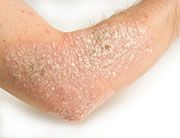Study Endorses Early TNF Use in Patients with Psoriasis
A new model that combines real-world prices with outcome data from both controlled trials and clinical practice indicates that the immediate use of tumor necrosis factor inhibitors (anti-TNFs) is a cost-effective way to achieve good first-year outcomes in patients newly diagnosed with both plaque psoriasis and psoriatic arthritis.

A new model that combines real-world prices with outcome data from both controlled trials and clinical practice indicates that the immediate use of tumor necrosis factor inhibitors (anti-TNFs) is a cost-effective way to achieve good first-year outcomes in patients newly diagnosed with both plaque psoriasis and psoriatic arthritis. For patients diagnosed with psoriatic arthritis but no psoriasis, however, apremilast makes more financial sense as a first option.
The model initially randomized hypothetical patients with psoriatic arthritis only to apremilast or an anti-TNF and then used efficacy data to predict responses. Those who showed a 20% reduction in disease symptoms as measured by American College of Rheumatology standards (i.e. an ACR20 response) at the end of each 12-week period continued on the same treatment for another 12-week period. Those with a lesser response at the end of a 12-week period switched to another treatment.
After one year, hypothetical patients who began on anti-TNFs were significantly more likely than those who began on apremilast to exhibit an ACR20 response: 70.4% vs. 59.6%. However, the cost per ACR20 response was higher at the end of that year for patients who began on anti-TNF medication rather than beginning on apremilast: $56,492 vs. $52,835.
The model also randomized patients with new cases of both psoriatic arthritis and plaque psoriasis to initial treatment with an anti-TNF or apremilast and used efficacy data to predict their responses. Those who exhibited both an ACR20 response and a 75% reduction in their Psoriasis Area and Severity Index score (i.e. a PASI75 response) at the end of each 12-week period continued on the same treatment for another 12 weeks. Those with lesser responses switched medications.
Again, initial anti-TNF treatment produced better outcomes at the 1-year mark. Some 41.0% of patients who started on anti-TNFs achieved had both ACR20 and PASI75 responses after 12 months compared to 30.0% of patients who started on apremilast. Among such patients, moreover, initial treatment with anti-TNF medication cost less per patient achieving both responses at 1 year than initial treatment with apremilast: $100,954 vs. $111,686.
The investigators who conducted the study believe their findings make a strong case for starting patients who are newly diagnosed with both psoriatic arthritis and plaque psoriasis on anti-TNF medication, even though it is more expensive than apremilast.
“When both joint and skin responses were accounted for, responses and cost trends were similar to analyses that were based on joint responses only, but total costs were much lower for timely use vs. delayed use of anti-TNFs. These results indicate that, overall, timely treatment with anti-TNFs is more expensive than delayed treatment, but for those patients with both skin and joint manifestations, cost savings can be substantial,” the study authors wrote in Rheumatology and Therapy. “Since 46% to 83% patients enrolled in anti-TNF randomized controlled trials have manifestations of psoriasis, this finding underscores the need to consider effectiveness for both joint and skin disease when assessing treatments for psoriatic arthritis.”
Consideration of skin condition as well as joint condition led the new study to reach a somewhat different conclusion than a 2014 paper that appeared in Value Health. That earlier paper found initial use of apremilast to be more cost-effective than initial use of the anti-TNF medications etanercept and adalimumab in patients with psoriatic arthritis.
Related Coverage:
Linking Psoriatic Arthritis and Cancer: Studies Differ
Trial Shows Ixekizumab Effective Against Psoriatic Arthritis
Psoriatic Arthritis More Common in Patients with Psoriasis than Previously Thought